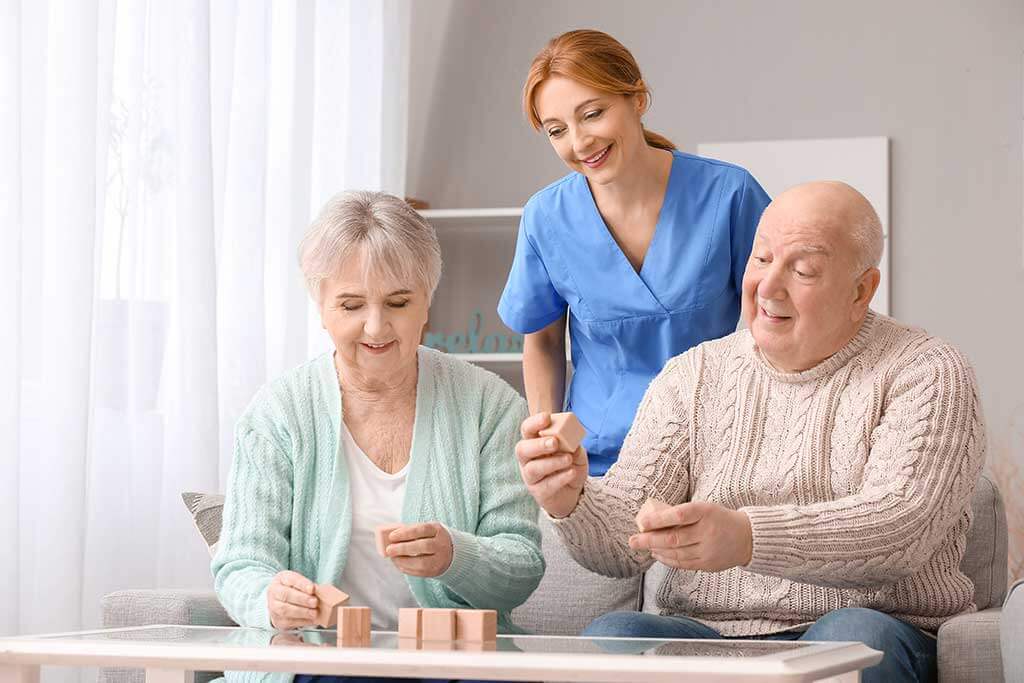Memory Care Charlotte: Professional Assistance for Seniors with Memory Demands
Memory Care Charlotte: Professional Assistance for Seniors with Memory Demands
Blog Article
Engaging Activities in Memory Treatment: Enhancing Health And Wellbeing in the house
In the realm of memory care, the relevance of interesting tasks can not be overemphasized. These tasks function as a foundation in improving the total wellness of people living with memory disabilities. By tapping into different sensory experiences, incorporating acquainted hobbies, exploring the extensive connection in between songs and memory, and participating in mind-boosting games, a globe of opportunities unfolds (Memory Care Charlotte). The impact of such activities reaches far beyond plain entertainment; it has the power to unlock memories, boost cognition, and foster a feeling of happiness and fulfillment.
Benefits of Involving Tasks
Involving activities play a critical role in enhancing cognitive feature and emotional health in people receiving memory treatment at home. These activities are developed to boost the mind, encourage social interaction, and give a sense of purpose for those experiencing memory loss. By participating in activities such as problems, reminiscence treatment, songs therapy, and art jobs, people can improve their cognitive capacities, memory retention, and overall lifestyle.
One significant advantage of engaging activities is the favorable effect they carry cognitive feature. Tasks that test the mind, such as word games or brain intros, assistance boost memory, focus, and problem-solving skills. This mental excitement is important for people with memory problems as it can reduce down cognitive decrease and enhance brain feature.
Moreover, engaging activities also promote psychological well-being by minimizing sensations of seclusion and clinical depression. Participating in team activities or one-on-one sessions with caregivers can increase mood, boost self-confidence, and produce a sense of belonging. These emotional benefits are essential for maintaining a favorable outlook and total mental health and wellness in individuals receiving memory care at home.
Producing a Sensory Experience

Including sensory experiences can be attained via numerous tasks. Furthermore, including acquainted fragrances like lavender or freshly baked cookies can evoke positive memories and sensations of comfort.
Integrating Familiar Leisure Activities
Including acquainted pastimes right into memory care tasks in the house can give a sense of continuity and joy for people with memory disabilities. Taking part in tasks that individuals have actually enjoyed throughout their lives can evoke favorable emotions, stimulate memories, and cultivate a feeling of accomplishment. Whether it's painting, knitting, gardening, or playing a musical tool, familiar pastimes offer a comforting and meaningful method for individuals with memory difficulties to attach with their past selves and keep a sense of this identification.
By integrating acquainted hobbies right into day-to-day routines, caregivers can produce a sense of normalcy and function for their enjoyed ones. These activities not only serve as a resource of entertainment but likewise aid in decreasing anxiousness, improving mood, and promoting cognitive function. Furthermore, involving in acquainted hobbies can trigger conversations, encourage social communications, and enhance overall health and wellbeing.
Caretakers need to adjust these leisure activities to suit the individual's present capacities and passions, making certain a secure and pleasurable experience. Giving the necessary support and inspiration, caregivers can assist individuals with memory problems remain to locate satisfaction and joy through their favorite activities.
Music and Memory Link
The relationship in between songs and memory is a effective and well-documented blog here sensation, demonstrating significant impacts on cognitive function and psychological wellness. Memory Care Charlotte. In the context of memory treatment, leveraging this connection can be a useful device in improving the lifestyle for individuals living with memory problems
Music has a distinct ability to evoke feelings and memories from the past, even in individuals with sophisticated phases of mental deterioration. Listening to familiar tracks or joining music therapy sessions can stimulate neural pathways connected with memory and feeling, activating reminiscences and improving state of mind. Engaging with songs can aid lower anxiety, agitation, and anxiety generally experienced by people with cognitive decrease.
Caregivers and relative can integrate music into everyday regimens by creating personalized playlists of beloved tunes, organizing sing-along sessions, or encouraging people to play music instruments. By incorporating songs right into memory care activities, it is feasible to develop purposeful experiences that promote cognitive excitement, emotional link, and total wellness in people with memory disabilities.
Mind-Boosting Games

Games like crossword puzzles, Sudoku, memory matching video games, and trivia quizzes are prominent selections for people in memory care. These activities not only offer amusement yet likewise offer a structured method to exercise the brain. Furthermore, games that include strategy and crucial reasoning, useful content such as chess or card games, can help boost cognitive abilities and thinking capacities.
Additionally, these mind-boosting video games can have a favorable impact on state of mind and psychological wellness. Involving in enjoyable activities and experiencing success in fixing problems or completing difficulties can boost confidence and self-confidence. Generally, including mind-boosting games into a memory treatment regimen can add significantly to the overall lifestyle for individuals with memory disabilities.
Conclusion
To conclude, engaging activities in memory treatment play an essential function in boosting well-being at home. By developing sensory experiences, integrating familiar hobbies, discovering the music and memory link, and engaging in mind-boosting games, individuals can enhance their cognitive capabilities and general lifestyle. These tasks provide mental stimulation, social interaction, and a sense of function, ultimately leading to a much more enriching and meeting experience for those coping with memory disabilities.
Structure on the foundation of cognitive and psychological advantages obtained from engaging activities, the consolidation of sensory experiences can additionally boost the well-being of people getting memory treatment at home. For people with memory disabilities, sensory activities can evoke memories, minimize stress and anxiety, and enhance total state of mind.
Integrating familiar pastimes right into memory care activities at home can give a sense of continuity and joy for people with memory impairments.Games like crossword problems, Sudoku, memory matching games, and facts tests are popular options for people in memory treatment. Overall, incorporating mind-boosting games right into a memory care routine can add considerably to the total top quality of life for individuals with memory disabilities.
Report this page